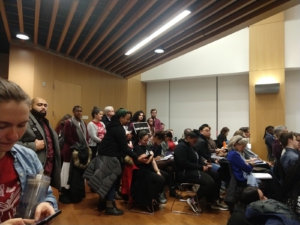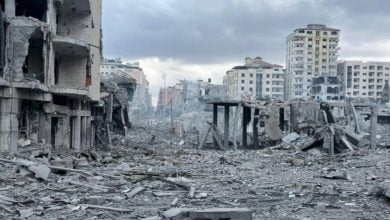On the evening of February 5, students, teachers, parents and community members packed Boston Public Schools’ Bolling Building for public testimony at a School Committee meeting regarding the Boston Teachers Union’s endorsement of the Black Lives Matter At School Week of Action. Public comments lasted over two hours.
BLMatSchool began in Seattle during the 2016-2017 school year, inspired by the actions of a renewed anti-racist movement that launched in response to many high-profile police executions of Black people. The campaign demands an end to zero tolerance policies that suspend, expel and criminalize students; the creation of more ethnic studies and Black history courses; the hiring of more Black teachers; and the funding of counselors — not cops.
The BTU has participated in BLMatSchool for the past four years, but this year their involvement was met with a letter of disapproval from the Boston Police Patrolmen’s Association.
In his letter, BPPA President Michael Leary calls BLM an “anti-police organization” and accuses the actions of being “based on irrational fear and hatred.” He writes that the BTU’s endorsement of the movement “affects public support for improving the wages, benefits, and working conditions of police officers.” He claims that “while more counselors may be a good idea, the idea that spending less on public safety will make our communities better or safer is ridiculous.” Leary continues the two-page tirade saying, “groups like Black Lives Matter, by inaccurately demonizing police as racists who kill innocent people, have made policing more dangerous than ever before.” He ends the letter arguing that the BTU should support “rebuilding trust between the police and the communities they serve” as if it is the responsibility of victims to reconcile with their oppressors.
In addition to ignoring the material reality that Black people face a double oppression of race and class in our society and are subsequently subjected to horrific violence from the enforcers of private property laws, Leary’s letter failed to mention the particularities of the Boston Police Department. First, BPD officers earn more than enough wages: 98 of the top 100 highest paid City of Boston employees in 2018 were in the BPD. In contrast, Boston teachers struggled last year for a contract that merely provided basic funding for schools and a living wage for paraprofessionals.
In alignment with the racist national history of the police — origins in slave patrols, legal enforcement of Jim Crow and segregation, the “war against drugs” and the resulting mass incarceration and police brutality — the BPD has a long track record of racism and disrespect towards the African American community. The BPD had a stop and frisk program that was only ruled unconstitutional in 2016. Just last year, a Boston cop was placed on leave after using the n-word and calling Black students “monkeys.” Currently, the Supreme Judicial Court is hearing a case in which a 17-year old African American boy was racially profiled by two white BPD officers. Anti-police sentiment in the Greater Boston Area is nothing new.
Although none of the speakers at the School Committee Meeting mentioned Leary or the letter by name, much of the testimony rebutted Leary’s claims and referred to the anti-Black history of the BPD. Community members also argued that the BPD’s involvement in schools has compromised the educational lives of students. Middle school student Joel Navares said, “We already have police in our communities. Schools should be a safe place. Why are police there? […] Police are not here to help us with our problems. They are here to watch.” Similarly, teacher Shontae Alves spoke about the racism of the legal and school systems:
“Our schools are all too often serving as a young person’s first point of contact with the criminal justice system. And far too many black and brown students have seen their education disrupted by suspensions and expulsions. In recent years, viral videos of school based police officers brutally attacking, tackling, dragging, and slamming onto the ground black and brown children over minor disciplinary infractions have emphasized the pervasiveness of school policies that criminalize and traumatize students.”

BTU President Jessica Tang stated: “We believe counselors need to be a higher funding priority than theoretically increasing the number of police in schools. With limited budgets and cuts, we believe that adequate access to social emotional well being and restorative practices are more effective than increasing police presence in our schools.” The national average number of students per guidance counselor is one guidance counselor for every 482 students, but the BPS average is one guidance counselor for every 1,338 students.
Drawing connections between police terror and the racist U.S. immigration system, many students and teachers testified about how the school district and police department are complicit in the surveillance and deportation of students from this alleged “sanctuary city.” Khymani James, a high school junior, criticized the absurdity of minor student misbehavior being used as evidence in a deportation hearing: “Reports for ridiculous things such as a disagreement with a teacher or a peer have the potential of not just reaching BPD but also BRIC [Boston Regional Information Center]. Information that should remain highly confidential is being sent to places and people who have the ability to use that information and cause harm and destruction.”
Rebecca Mulligan, a teacher with Unafraid Educators, a BTU immigrant rights group, said,
“We cannot honestly celebrate and encourage our students while quietly handing their information over to law enforcement. We cannot tell them we welcome them into our schools when we are contributing to the possibility that they could be violently removed or otherwise incarcerated. […] Students’ trauma is compounded by the fear of being detained and deported or losing loved ones to such violent removal. It’s a trauma and fear that is shared by their black and brown peers who know that they and their families are more heavily and unjustly policed.”
High school student Abdullahi Gurhan expanded on this point, talking about BPD’s treatment of Somali Muslim students, who have been treated as if they are national security threats through the Countering Violent Extremism program that explicitly targets and profiles these young people. He connected the injustices faced by Somali students to BPS’s collaboration with ICE:
“This does not affect only immigrants living in Boston, but also practicing Muslims such as myself. I do not wish for BPS to help give info to the Boston Police Department especially since the Boston Police has programs such as YPIP or the Youth and Police Initiative Plus. This is a program funded by the Department of Homeland Security that recruits Somali youth to interact with Boston Police Department officers. However, this is done with the presumption that Somali youth are inherently violent. The program states and I quote, ‘Somali youth are enticed by officers’ capacity to carry weapons, their loyalty, and almost gang-like dress code.’ The intention is to expand the program to Boston Public Schools at some point. I find this to be quite offensive as a Somali myself. And I wish for public schools to have no part in this program and any others like it.”
Teachers and students testified about cuts in funding for public education and the connection between these budgetary constraints and racism. Donell Davis, a 5th grade elementary school student, ended his speech in tears: “I’m here to tell you what our school needs. Our school needs counselors and emotional support, fresh food, art classes, and better facilities, and secure and clean bathrooms, a gymnasium, and field trip transportation. To go further, our more needed thing is secure and clean bathrooms. In our bathroom, we run out of toilet paper and the bathroom is not very clean. So we ask that…we ask that you help us.” Classmates consoled Davis after his remarks.
Far too often we hear there is not enough money for essential services such as public education, but the problem for the city is not money, but priorities. The capitalist system values corporate subsidies and wars of aggression more than basic human rights such as healthcare, education and housing. The School Committee meeting was a testament to the power of the people in standing together to condemn the ways young people and children are criminalized and discarded in the capitalist system. The Party for Socialism and Liberation stands in complete solidarity with the Boston Teachers Union in their call for racial justice and their demand to increase funding for school counselors — not cops.






